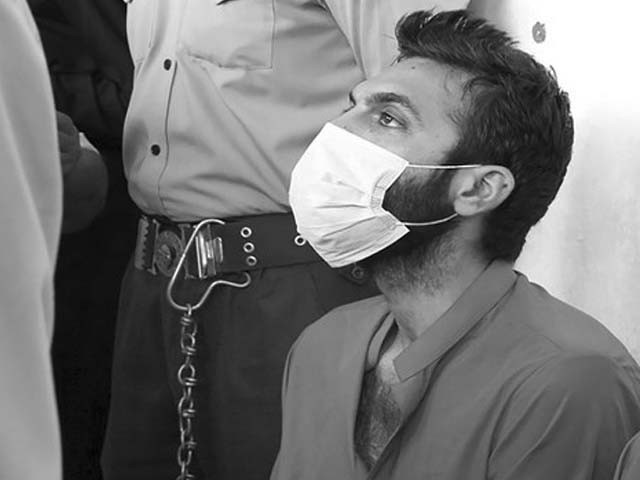In a predictable turn of events, amidst dramatic displays of contempt by the accused, Zahir Jaffer, during the trial proceedings of Noor Mukadam’s murder case, the defence team representing Jaffer moved an application before the court, under Section 465 of the Code of Criminal Procedure (CrPC) 1898 – read with other enabling provisions of the law – in order to determine the “lunacy/unsoundmindness of the accused”. This perhaps was the only legal option available to the defence lawyers, which may potentially enable them to argue that he suffers from a mental illness and was incapable of knowing the nature of his acts at the time he was committing them, i.e. the ‘defence of insanity’.
The origins of the insanity defence can be traced backed to Roman jurisprudence; however, this defence was formally conceived by the House of Lords in M’Naghten’s case in 1843. The House of Lords set out certain rules, which had to be satisfied before an accused could be allowed to benefit from the relief that followed, stating:
“That every man is to be presumed to be sane, and to establish a defence on the ground of insanity, it must be clearly proved that at the time of committing the act, the party accused was labouring under such a defect of reason, from disease of the mind, as not know the nature and quality of the act he was doing, or if he did know it, he did not know that what he was doing was wrong.”
The defence of insanity is also available in Section 84 of the Pakistan Penal Code (PPC) 1860, which categorically and unequivocally states:
“Nothing is an offence which is done by a person who, at the time of doing it, by reason of unsoundness of mind, is incapable of knowing the nature of the act, or that he is doing what is either wrong or contrary to law.”
It is to be noted that the contents of Section 84 are closely replicating the rules laid down by the House of Lords in the M’Naghten case.
A bare review of the aforementioned section may give an impression that by raising this defence, Jaffer’s legal team may be able to persuade the court that the actions of their client fall within the purview of Section 84. The defence lawyers would heavily rely on the recent conduct of the accused in an attempt to establish or persuade the court that there exists the need to get Jaffer’s mental soundness evaluated by a panel of experts.
However, it is imperative to note that the Honourable Courts of Pakistan have held that:
“…not every person who is mentally disturbed or is suffering from some mental illness(es) is, ipso facto, exempted from criminal liability. Any person who seeks to benefit of Section 84 of PPC must prove that at the time of committing the act, he was labouring under such defect of reason as not to know the nature and consequences of the act he was doing.”
Moreover, the apex courts of Pakistan have endorsed the principle that the person who has committed an act shall be presumed to have committed the same while possessing sufficient degree of reason, unless and until the contrary is proved (PLD 1962 Dacca 467).
Furthermore, it has been held by the Lahore High Court in multiple cases that the onus to prove the correctness of a plea under Section 84 shall always remain on the accused, otherwise the same shall be decided by examining the material and evidence available on the record (PLD 1952 Lahore 502, PLD 1953 Lahore 213). Since paragraph nine of the application moved by Jaffer states that he was a “chronic patient of mental disorder/schizo-affective disorder due to drug psychosis and the same was the position at the time of his arrest on July 7, 2021”, the burden of proof lies on him to establish this assertion beyond reasonable doubt, in order to avail the relief provided in Section 84, though not explicitly claimed.
The aforementioned application has been filed under Section 465. Hence, a deeper appreciation of Section 465 of the CrPC is warranted in order to ascertain the possible outcome(s) of the application. A bare perusal of the said section denotes that the court has to,
“…if it has reasons to believe that the accused in the case is of unsound mind and in consequence is incapable of making his defence, to first hold an inquiry into the facts of such unsoundness of mind of the accused and for that purpose to get the accused examined by the civil surgeon of the district or by such other medical officer as the provincial government may direct and then record the result of such examination in writing. Pending inquiry into the unsoundness of mind of the accused the trail before the court is to remain suspended.” (1994 SCMR 1517)
In other words, the court first has to be convinced that Jaffer is actually of unsound mind and suffers from a mental illness. If it does not appear to the court, from its own observation or from examining other material on record, that Jaffer is incapable of making his defence, then the obligation of referring his case to a medical board does not arise.
The Honourable Supreme Court of Pakistan, through a resent landmark judgement cited as PLD 2021 SC 488, has directed the lower courts to place great importance on the issue of the mental health of an accused while conducting judicial proceedings. In the said case, the court appointed Brigadier (Retd) Professor Dr Mowadat Hussain Rana as amici curiae (impartial adviser to the court). Dr Rana adequately addressed various misconceptions pertaining to metal health and explained in detail the various specific assessment methods, diagnostic laboratories, radiological tests, and scans of functions of the brain, among other scientific techniques, which can be utilised to adequately determine or diagnose mental illnesses. The court, based on the recommendations of Dr Rana, directed the federal government and all provincial governments to:
“immediately constitute and notify a medical board consisting of two qualified and experienced psychiatrists and one psychologist from public sector hospitals in Islamabad... and at each divisional headquarter of the provinces for examination, assessment and rehabilitation of the prisoners i.e. under-trial and convicts, if referred by the jail authorities. The said medical board shall also be authorised to examine those accused persons who are referred by the trail court(s) for examination under the provisions of section 464 and 465 CrPC.”
One can hope that if the government, acting on the directions of the Honourable Supreme Court of Pakistan, constitutes a medical board, as provided within the aforementioned judgement, comprising of professionals – with the experience, necessary skillset, integrity and character – then the potential abuse of section 465 CrPC could be averted. More specifically, even if the court is of the tentative opinion, based on the conduct and demeanour of Jaffer, that he is of unsound mind and suffers from a mental illness, the newly constituted medical board of experts may very well be able to determine the true state of his mental health at the time of committing the alleged offence, along with his current mental status.



COMMENTS (7)
Please hang this guy from the pole and do not waste our time and money. Period.
He was sane enough to pull her back indoors more than once as seen in footage. He was sane enough to order food delivery He was sane enough to book tickets to US
I was waiting for a lawyer inputs on these new developments. Hopefully justice prevail in this country.
No woman will feel safe again in this land if this beast is let free. Demanding exemplary punishment
Just watch how money speaks loudly.... police,prosecution,defense and judges are all drooling and getting cash money.
Let the courts of justice allow medical boards make some hay out of murder of a young lady.
Comments are moderated and generally will be posted if they are on-topic and not abusive.
For more information, please see our Comments FAQ